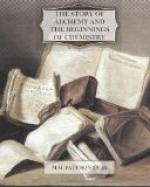That the attribution, by the alchemists, of moral virtues and vices to natural things was in keeping with some deep-seated tendency of human nature, is shown by the persistence of some of their methods of stating the properties of substances: we still speak of “perfect and imperfect gases,” “noble and base metals,” “good and bad conductors of electricity,” and “laws governing natural phenomena.”
Convinced of the simplicity of nature, certain that all natural events follow one course, sure that this course was known to them and was represented by the growth of plants and animals, the alchemists set themselves the task, firstly, of proving by observations and experiments that their view of natural occurrences was correct; and, secondly, of discovering and gaining possession of the instrument whereby nature effects her transmutations and perfects her operations. The mastery of this instrument would give them power to change any metal into gold, the cure of all diseases, and the happiness which must come from the practical knowledge of the supreme secret of nature.
The central quest of alchemy was the quest of an undefined and undefinable something wherein was supposed to be contained all the powers and potencies of life, and whatever makes life worth living.
The names given to this mystical something were as many as the properties which were assigned to it. It was called the one thing, the essence, the philosopher’s stone, the stone of wisdom, the heavenly balm, the divine water, the virgin water, the carbuncle of the sun, the old dragon, the lion, the basilisk, the phoenix; and many other names were given to it.
We may come near to expressing the alchemist’s view of the essential character of the object of their search by naming it the soul of all things. “Alchemy,” a modern writer says, “is the science of the soul of all things.”
The essence was supposed to have a material form, an ethereal or middle nature, and an immaterial or spiritual life.
No one might hope to make this essence from any one substance, because, as one of the alchemists says, “It is the attribute of God alone to make one out of one; you must produce one thing out of two by natural generation.” The alchemists did not pretend to create gold, but only to produce it from other things.
The author of A Brief Guide to the Celestial Ruby says: “We do not, as is sometimes said, profess to create gold and silver, but only to find an agent which ... is capable of entering into an intimate and maturing union with the Mercury of the base metals.” And again: “Our Art ... only arrogates to itself the power of developing, through the removal of all defects and superfluities, the golden nature which the baser metals possess.” Bonus, in his tract on The New Pearl of Great Price (16th century), says: “The Art of Alchemy ... does not create metals, or even develop them out of the metallic first-substance; it only takes up the unfinished handicraft of Nature and completes it.... Nature has only left a comparatively small thing for the artist to do—the completion of that which she has already begun.”




